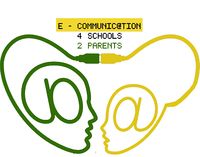ECom4s2p: Difference between revisions
Letizia Atti (talk | contribs) No edit summary |
No edit summary |
||
| Line 1: | Line 1: | ||
{{Project | {{Project | ||
|acronym= | |acronym=eCom4s2p | ||
|logo= ECom4s2p_logo_1.JPG | |logo= ECom4s2p_logo_1.JPG | ||
|project_title= [[ | |project_title= [[e-communIC@Tion 4 schools 2 parents]] | ||
|contract_number= | |contract_number= | ||
|funding_period= 2010-2012 | |funding_period= 2010-2012 | ||
Revision as of 22:42, 25 October 2014
|
E-com4S2P Project is founded by the European Union (Leonardo LLP project). The project is coordinated by Katholieke Hogeschool Limburg dept SAW(Limburg Catholic University College), Hasselt Belgium, in collaboration with Université d'Avignon et des Pays de Vaucluse (U.A.P.V.) Avignon France, Zespół Szkół Nr 1, Technikum Nr 1 im. Prof. Bolesława Krupińskiego w Lubinie (Vocational or technical secondary school ) Lubin Poland; Tekkeköy Halk Eğitim Merkezi (Adult education provider), Samsun Turkey; Kavakmeydan vocational trade high school Tabzon Turkey; INDICO International institute for the development of innovation, knowledge and competences, Zaragoza Spain; Zespół Szkół Elektronicznych i Telekomunikacyjnych (Vocational or technical secondary school ), Olsztyn Poland ; BilSE-Institut für Bildung und Forschung GmbH, Güstrow Germany; Cyprus Neuroscience and Technology Institute, Nicosia Cyprus
Communication between schools and families is essential for building trusting relationships that foster parental involvement. Parental involvement in schools and social institutes is necessary for youngsters to develop successfully and to make decisions that will have positive outcomes for their futures.
This study will examine the role of new ICT communications technologies in fostering parental involvement in schools and social institutes and uncovers barriers that prevent usage of technology to promote communication. Little research has been done to evaluate the role of emerging technologies in enhancing communication practices between schools specialised in vocational training and parents/guardians.
Overall objectives
The purpose of this study is to evaluate the role and possibilities of different interpersonal communications technologies like cell phone and e-mail, school websites, blog, electronic learning environments and new social websites like Facebook, Twitter, etc. in communicating with parents. Additionally, these communication modes will be appraised for their efficacy in facilitating parental involvement in schools.
